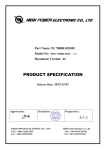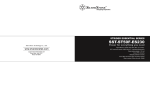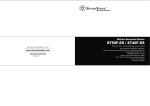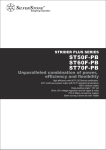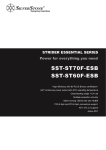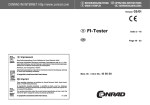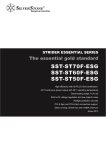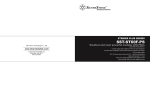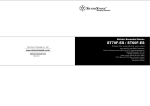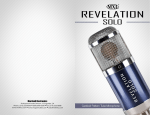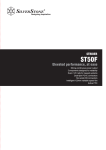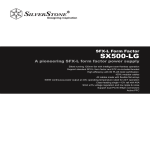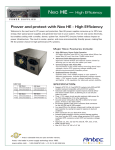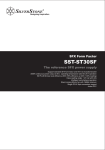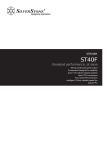Download Silverstone ST40F-ESB
Transcript
STRIDER ESSENTIAL SERIES ST40F-ESB ST50F-ESB Power for everything you need High efficiency with 80 PLUS Bronze certification o 24/7 continuous power output with 40 C operating temperature Class-leading single +12V rail Multiple protection circuitry Silent running 120mm fan with 18dBA PCI-E connectors support Active PFC Installation and system optimization guide: The following manual and guides were carefully prepared by the SilverStone engineering team to help you maximize the potential of your SilverStone product. Please keep this manual for future reference when upgrading or performing maintenance on your system. A copy of this manual can also be downloaded from our website at: General P.1 Input Characteristics P.1 Output Characteristics P.2 Protection P.5 Start Stability P.5 Environments P.6 Conducted EMI P.6 Product Safety P.6 Power Good Signal P.7 MTBF P.8 Burn-In P.8 Harmonics P.8 Power Factor P.8 Mechanical Specification P.8 SPECIFICATION SilverStone Strider Essential ST50F-ESB ST40F-ESB ATX12V 2.3 Switching Power Supply With Active PFC 80 Plus Bronze PS/2 1. General 1.1 Scope This specification defines the performance characteristics of a single phase 500/400 watts, 5 output power supply. This specification also defines worldwide safety and electromagnetic compatibility requirements for the power supply which is intended for use in computer products. 2. Input Characteristics 2.1 Input Voltage Nominal Voltage Voltage Variation Range 115-230 Vrms 103.5 - 253 Vrms 2.2 Input Frequency Nominal Frequency Frequency Variation Range 50-60 Hz 47 Hz to 63 Hz The power supply must operate at above frequency with 103.5 - 253VACrms input voltage range. 01 2.3 Max. Input AC Current Max. Input Current Measuring Range 8A 103.5 - 253 Vrms 2.4 Inrush Current The power supply must meet inrush requirements for any rated AC voltage, during turn on at any phase of AC voltage, during a single cycle AC dropout condition, during repetitive ON/OFF cycling of AC, and over the specified temperature range. The peak inrush current shall be less than the ratings of its critical components (including input fuse, bulk rectifiers, and surge limiting device). 2.5 Efficiency ST50F-ESB, ST40F-ESB provides an efficiency of 82% when measured at full load under 115V/60Hz condition. 3. Output characteristics 3.1 Normal Operation Output SST-ST50F-ESB Output Load Range Voltage MIN MAX Peak Regulation Ripple & Noise P-P Max. +5V 0.2A 20A - ±5% 50mV +3.3V 0.1A 20A - ±5% 50mV +12V 0.6A 37.5A - ±5% 120mV -12V 0.0A 0.3A - ±10% 120mV +5Vsb 0.0A 2.5A 3.5A ±5% 50mV Maximum continuous total DC output power should not exceed 500W. Maximum continuous combined load on +3.3VDC and +5VDC outputs shall not exceed 103W. Maximum combined load on 12V outputs shall not exceed 450W. NOTE: Noise test should be measured with 20 MHz bandwidth frequency oscilloscope. The output terminal shall add a tantalum capacitor of 10uF in parallel with a ceramic capacitor of 0.1uF. 02 SST-ST40F-ESB Output Load Range Peak Regulation Ripple & Noise Voltage MIN MAX +5V 0.2A 20.0A - ±5% 50mV +3.3V 0.1A 20.0A - ±5% 50mV +12V 0.6A 30.0A - ±5% 120mV -12V 0.0A 0.3A - ±10% 120mV +5Vsb 0.0A 2.5A 3.5A ±5% 50mV P-P Max. Maximum continuous total DC output power should not exceed 400W. Maximum continuous combined load on +3.3VDC and +5VDC outputs shall not exceed 103W. Maximum combined load on 12V outputs shall not exceed 360W. NOTE: Noise test should be measured with 20 MHz bandwidth frequency oscilloscope. The output terminal shall add a tantalum capacitor of 10uF in parallel with a ceramic capacitor of 0.1uF. 3.2 Remote On/Off Controlled mode The PSON# signal is required to remotely turn on/off the power supply, PSON# is an active low signal that turns on the output power rails. When this is not pulled low by the system, or left open, the outputs (except the +5VSB) turn off. This signal is pulled to a standby voltage by a pull-up resistor internal to the power supply. TTL level "H" 2.0 V - 5.25 V "L" 0.0 V – 1.0 V 3.3 Regulation The cross regulation defined as follows, the output regulation should be within the specified range. Load +5V +3.3V +12V -12V +5Vsb Light Load. 2.18 A 2.18 A 6.59 A 0.05 A 0.44 A Typical Load 5.45 A 5.45 A 16.47 A 0.13 A 1.10 A Full Load 10.90 A 10.90 A 32.95 A 0.26 A 2.20 A 3.4 Rise Time DC output rise time is less than 20 mS at nominal line and full load. 03 3.5 Hold-up Time DC +5V output maintains at least 16mS ,after power off , under 230V/50Hz 75%Load condition. 3.6 5VSB 5VSB is requierd for the implementation of PS-ON described above. 5VSB is a standby voltage that may be used to power circuits that require power input during the powered-down state of all power rails. The 5 VSB pin should deliver 5V ± 5% at a minimum of 2.5 A for PC board circuits to operate. Conversely, PC board should draw no more than 2.5A maximum form this pin. This power may be used to operate circuits such as soft power control. 3.7 PG-OK PG-OK is a power good signal and should be asserted high by power supply to indicate that the +5 VDC and +3.3 VDC outputs are above the under-voltage thresholds of the power supply. When this signal is asserted high, there should be sufficient mains energy stored by the converter to guarantee continuous power operation within specification. Conversely, when either the +5VDC or the +3.3VDC output voltage falls below the under-voltage threshold, or when mains power has been removed for a time sufficiently long so that power supply operation is no longer guaranteed, PG-OK should be deasserted to a low state. See Figure 1 for a representation of the timing characteristics of the PG-OK,PS-ON, and germane power rail signals. 3.8 3.3V Sense A default 3.3V sense line should be implemented pin 13 of the connector. 3.9 Capacitive Load The power supply should be able to power up and operate normally with the following capacitances simultaneously present on the DC outputs. Output Capacitive load (uF) +5V 6000 +12V 8000 +3.3V 6000 -12V 350 +5VS 350 04 4. Protection 4.1 Input Protection In primary circuit of the power supply , a protected fuse is inserted. Only internal fault of the power supply will cause the fuse blown. Any overload or short circuit at DC output will keep from fuse brown or fire hazard. 4.2 Output Protection 4.2.1 Under voltage protection The +5V/+3.3V DC output are protected against the under voltage condition, range value can't be exceed 3.3~3.7V at 5V terminal and 2.0~2.4V at 3.3V. 4.2.2 Over Voltage Protection The +5V/+12V/+3.3V DC output are protected against the over voltage condition . Maximum value can't be over 6.5V at 5V terminal and 15.5V at 12V, 4.3V at 3.3V. 4.2.3 Over Power Protection The power supply can be used electronic circuit to limit the output current against exceeding 50% of surge output power or protected against excessive power delivery since short circuit of any output or over total power at high line. 4.2.4 Short Circuit Protection Short circuit placed on +5V,+12V,+3.3V,-12V will latch off. +5VSB will auto-recovery. 5. Start Stability 5.1 No Load Start When power is applied to ST50F-ESB, ST40F-ESB with no load connected or under minimum load connected, neither damage to power supply nor hazards to users will occur. 5.2 Cold Start The power supply shall operate properly when first applied at normal input voltage and or so maximum load after 4 hours storage in 0℃ environment. 05 6. Environments 6.1 Temperature and Humidity 6.1.1 Operating Temperature Relative Humidity o 0 to 40 C 20 to 90 % 6.1.2 Storage Temperature Relative Humidity o -40 to 70 C 20 to 95 % noncondensing 6.2 Altitude The power supply can operate normally at any altitude between 0 to 10000 feet. 6.3 Vibration and Shock Sweep and resonance search for each of X,Y,Z, axis at the sweep. RATE of 1/OCTAVE/Min. Frequency Duration Amplitude 5-55-10 Hz 30 minutes 0.35 mm 7. Conducted EMI CE , FCC 8. Product Safety 8.1 Safety Requirement TUV, CUS , CB 8.2 Leakage Current The AC leakage current is less than 3.5mA when the power supply connect to 253Vac/50Hz . 8.3 Insulation Resistance The insulation resistance should be not less than 30M ohm after applying of 500VDC for 1 minute. 06 8.4 Dielectric Voltage Withstand The power supply shall withstand for 1 minute without breakdown the application of a 60Hz 1500V AC voltage applied between both input line and chassis (20mA DC cut-off current). Main transformer shall similarly withstand 3000Vac applied between both primary and secondary windings for a minimum of one minute. 9. Power Good Signal A TTL compatible signal for the purpose of initiating an orderly start-up procedure under normal input operating conditions. During power up, this signal is asserted ( low ) until +5V is under regulation and AC reaches min. line specification range. After all voltage are going appropriate level, the system may have a turn on delay of 100mS, but no greater than 500mS. During power off the signal should go to low level before +5V is out of regulation. The low level is 0 to 0.8V and high level is 4.75 to 5.25V. The " Power Good "signal can drive up to 6 standard TTL loads. Time Diagram Figure 1 T1 : Turn on time ( 2 sec. Max.) T2 : Rise time ( ≦ 20mS Max.) T3 : Power good turn on delay time ( 100 < T3 < 500 mS ) T4 : Switch on time (0.5 sec. Max.) T5 : Power good turn off delay time ( 1.0 mS Min.) PS-ON/OFF T6 : Power hold-up time ( 16 mS Min.) Power on-off cycle : When the power supply is turned off for a minimum of 2.0 sec. and turn on again, the power good signal will be asserted. 07 10. MTBF The MTBF of the power should be 50,000 hours min. 11. Burn-In 11.1 Input Voltage Applying 220Vac for230Vac model. 11.2 Test Condition Applying 75% loads for the power supply in 40 (+/-5) oC chamber for 4 hours. 12. Harmonics The product shall meet requirement for EN61000-3-2 & EN61000-3-3 :2003 standard of class D, test at 230Vac 50Hz. 13. Power Factor The power supply with active power factor correction, and meet the EN61000-3-2 standards, The power factor is greater than 0.9 at 230V/50Hz, Max. load. 14. Mechanical Specification 150 mm (W) × 86 mm (H) × 140mm (D) 08 G11222300












